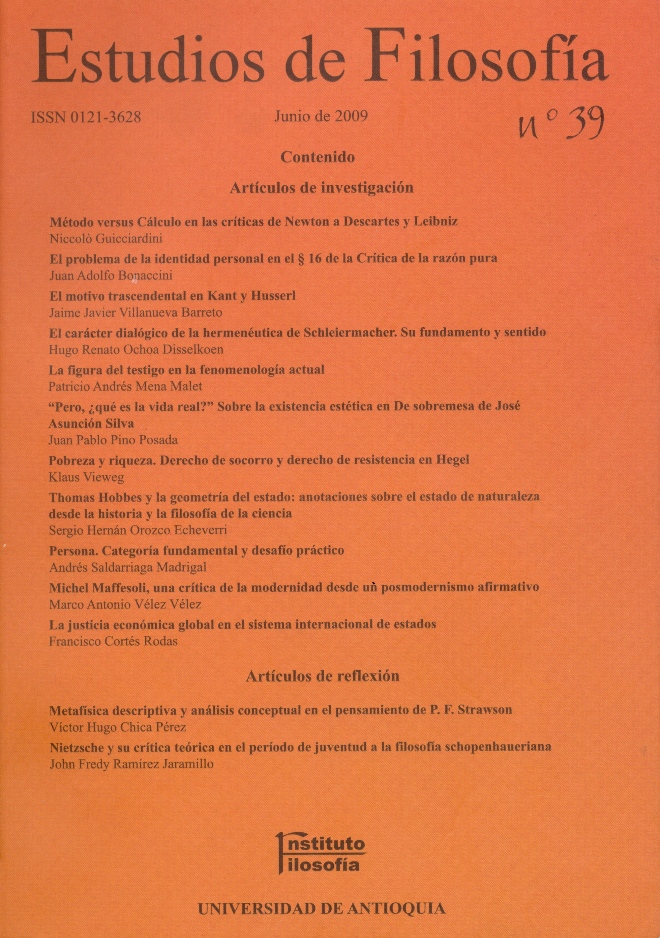Thomas Hobbes and the geometry of the Commonwealth: notes on the state of nature from the history of science
DOI:
https://doi.org/10.17533/udea.ef.12680Keywords:
History of Science, Scienti c Revolution, Thomas Hobbes, Theory of Knowledge, state of natureAbstract
This article pretends to shed light on Hobbes’s concept of state of nature, through a reading of his conception of knowledge which makes possible to relate him with the ‘New Science’ or the Scientific Revolution. In consequence, this article relates Hobbes with some problems and traditions of the Scientific Revolution through a fresh reading of his theory of knowledge, whence the concept of state of nature is rede ned in terms of integral cause; this makes possible to argue the need of Commonwealth, excluding the anthropological pessimism traditionally attributed to Hobbes.
Downloads
References
BACON, Sir Francis (1857-1874). The Works of Francis Bacon, collected and edited by James Speeding, Robert Leslie Ellis, Douglas Denon Heath (facksimile-neudruck der ausgabe von Spedding, Ellis und Heath, London 1857-1874 in Vierzehn Bänden). Frommann-Holzboog, Stuttgart-Bad Cannstat, 1989. DOI: https://doi.org/10.5962/bhl.title.25740
PINNICK, Cassandra. “What’s Wrong with the Strong Programme’s Case Study of the ‘Hobbes-Boyle Dispute’?” in: Koertge, N. A House Built on Sand. Oxford University Press, Oxford, 1998. DOI: https://doi.org/10.1093/0195117255.003.0015
DEAR, Peter. Discipline and experience. The mathematical way in the Scientific Revolution. Chicago University Press, Chicago, 1995. DOI: https://doi.org/10.7208/chicago/9780226139524.001.0001
DESCARTES, René. Reglas para la dirección del espíritu, introducción, traducción y notas de Juan Manuel Navarro Cordón. Alianza editorial, Madrid, 1996 [1628].
GOLDSMITH, Maurice Marks. Thomas Hobbes o la política como ciencia. F. C. E., México, 1990.
HOBBES, Thomas (EW). The English Works of Thomas Hobbes of Malmesbury, XI Vols., Now First Collected and Edited by Sir William Molesworth. Bart, London, 1839-1845.
HOBBES, Thomas (OL). Thomæ Hobbes Malmesburiensis Opera Philosophica quæ latine scripsit omnia, Studio et labore Guilielmi Molesworth, V vols. Apud Bohn, Londini, 1839-1845.
HOBBES, Thomas. Critique du De Mundo de Thomas White, édition critique d’un texte inédit par Jean Jacquot et Harold Whitmore Jones. J. Vrin, Paris, 1973.
HOBBES, Thomas. Leviathan. With selected variants from the Latin edition of 1668, edited, with Introduction, by Edwin Curley. Hackett, Indiana, 1994.
HOBBES, Thomas. Tratado sobre el ciudadano, edición de Joaquín Rodríguez Feo. Trotta, Madrid, 1999.
HOBBES, Thomas. Tratado sobre el cuerpo, introducción, traducción y notas de Joaquín Rodríguez Feo. Trotta, Madrid, 2000.
HOBBES, Thomas. Leviatán. O la materia, forma y poder de una república eclesiástica y civil, traducción y prefacio de Manuel Sánchez Sarto. F. C. E., Buenos Aires, 2005.
JESSEPH, Douglas. “Hobbes and the method of natural science”, in: Sorell, Tom (ed.) The Cambridge Companion to Hobbes. Cambridge University Press, Cambridge, 1996. DOI: https://doi.org/10.1017/CCOL0521410193.005
JESSEPH, Douglas. Squaring the circle. The war between Hobbes and Wallis. Chicago University Press, Chicago, 1999.
MACPHERSON, Crawford Brough. The Political Theory of Possessive Individualism: Hobbes to Locke. Oxford University Press, Oxford, 1967.
MALCOM, Noel. Aspects of Hobbes. Oxford University Press, Oxford, 2002.
PETTIT, Philip. Made with Words. Hobbes on language, mind and politics. Princeton University Press, Princeton, 2008. DOI: https://doi.org/10.1515/9781400828227
ROGERS, G. A & Ryan, Alan. Perspectives on Thomas Hobbes. Oxford University Press, Oxford, 1988.
RORTY, Richard. Philosophy and the mirror of nature. Princeton University Press, Princeton, 1979.
SHAPIN, Steven & SCHAFFER, Simon. Leviathan and the Air Pump. Hobbes, Boyle and the experimental life. Princeton University Press, Princeton, 1985.
SKINNER, Quentin. Reason and rethoric in the philosophy of Hobbes. Cambridge University Press, Cambridge, 1996. DOI: https://doi.org/10.1017/CBO9780511598579
ZARKA, Yves-Charles. “First philosophy and the foundation of knowledge”, in: Sorell, Tom. The Cambridge Companion to Hobbes. Cambridge University Press, Cambridge, 1996, pp. 62-85. DOI: https://doi.org/10.1017/CCOL0521410193.004
Downloads
Published
How to Cite
Issue
Section
Categories
License
Copyright (c) 2009 Sergio H. Orozco-Echeverri

This work is licensed under a Creative Commons Attribution-NonCommercial-ShareAlike 4.0 International License.
Authors who publish with this journal agree to the following terms:
1. The Author retains copyright in the Work, where the term "Work" shall include all digital objects that may result in subsequent electronic publication or distribution.
2. Upon acceptance of the Work, the author shall grant to the Publisher the right of first publication of the Work.
3. The Author shall grant to the Publisher a nonexclusive perpetual right and license to publish, archive, and make accessible the Work in whole or in part in all forms of media now or hereafter known under a Creative Commons Attribution-NoCommercia-ShareAlike (CC BY-NC-SA 4.0), or its equivalent, which, for the avoidance of doubt, allows others to copy, distribute, and transmit the Work under the following conditions: (a) Attribution: Other users must attribute the Work in the manner specified by the author as indicated on the journal Web site;(b) Noncommercial: Other users (including Publisher) may not use this Work for commercial purposes;
4. The Author is able to enter into separate, additional contractual arrangements for the nonexclusive distribution of the journal's published version of the Work (e.g., post it to an institutional repository or publish it in a book), as long as there is provided in the document an acknowledgement of its initial publication in this journal;
5. Authors are permitted, and Estudios de Filosofía promotes, to post online the preprint manuscript of the Work in institutional repositories or on their Websites prior to and during the submission process, as it can lead to productive exchanges, as well as earlier and greater citation of published work (see The Effect of Open Access). Any such posting made before acceptance and publication of the Work is expected be updated upon publication to include a reference to the Estudios de Filosofía's assigned URL to the Article and its final published version in Estudios de Filosofía.















